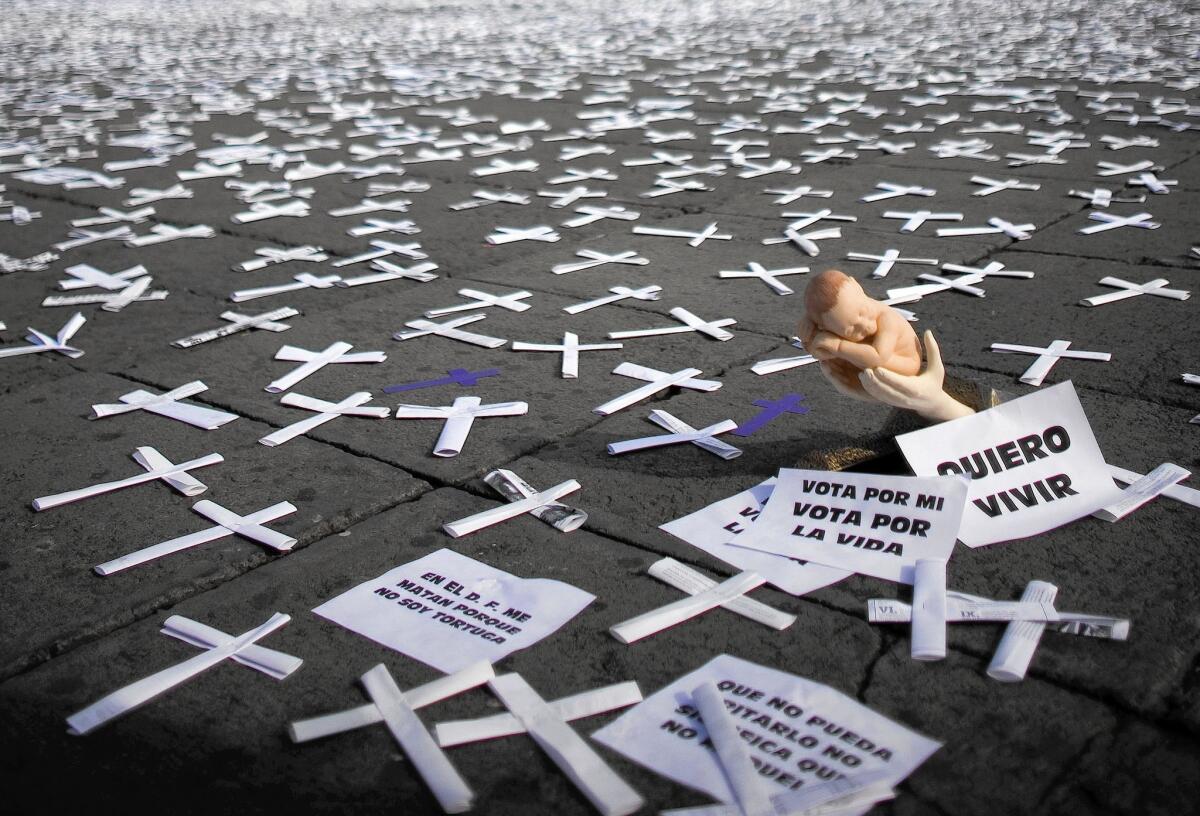Mexico abortion foes hold U.S.-style protests outside clinics

- Share via
Reporting from Mexico City — Little toy babies swaddled in rosary beads adorn a table protesters have set up outside a Mexico City abortion and family-planning clinic. The handful of demonstrators pray and sing and call out to women entering the center: “Don’t kill it!”
The tactics are familiar to anyone who has observed the antiabortion movement in the United States. But this is relatively new in Mexico City. The first demonstrations took place in the fall, and now a 40-day “vigil” has begun at three clinics here, timed to coincide with the season of Lent.
Taking a cue from their U.S. counterparts, the demonstrators say they are determined to end abortion.
“The point of this mission is to pray for the end of abortion, for the mothers, for the aborted children, for the doctors and nurses,” said Diana Guerrero, 26, an organizer.
In a region stretching from the Rio Grande to the Panama Canal, Mexico City, a federal district that is separate from Mexico’s 31 states, is the only place where abortion on demand is legal. Many Mexican states allow abortion in cases such as rape or malformed fetuses and have stopped attempting to prosecute women who have miscarriages. The most draconian laws are in the leftist-ruled countries of El Salvador and Nicaragua, where abortion is completely illegal.
That makes Mexico City a key battleground for abortion rights advocates and their opponents.
“We know they have an impact on the numbers of women who show up,” said Carla Eckhardt, program director for the Marie Stopes organization, which runs the clinics. “We respect their right to pray and protest, but at some point it becomes a security issue. It escalates.”
The demonstrators, organized under an umbrella they are calling 40 Days for Life, have targeted Marie Stopes clinics specifically. The group is the second-largest provider of abortions after the government, Eckhardt said.
Lourdes Varela, another organizer who led a candle procession to a clinic in the bohemian neighborhood of Roma the other day, said the decision to focus on Marie Stopes was made because the organization said it had performed 65,000 abortions in Mexico City in the last four years and announced plans to expand at a rate of 10% a year.
“It was [the clinic group] that was most often being mentioned,” Varela said. “We got the know-how” from similar antiabortion organizations in the U.S..
Marie Stopes, a global reproductive health network, is not bashful about its preeminence and embarked on a marketing program to get the word out that safe, inexpensive abortions are available and legal, Eckhardt said.
“Abortion is still pretty new here. People don’t want to talk about it,” she said, seated in a consultation room in a clinic in the southern neighborhood of Coyoacan. “By us talking, everyone’s services and awareness go up. We take the burden of being out front. We just want it safe.”
The clinics charge the equivalent of about $250 for a routine abortion, which was legalized in Mexico City in 2007.
Varela and Guerrero, the protest organizers, insisted that their members were participating in the vigil only to pray and would protest peacefully.
“We do not plan to shout, offend, bother or scare,” said Guerrero, standing outside the Coyoacan clinic, a large pewter crucifix around her neck. Someone lighted candles and another sprinkled water on the sidewalk in front of the clinic as if baptizing it.
Even so, videos made by clinic staffers showed some of the demonstrators shouting at patients, following them down the street as they leave and speaking loudly of “the murder of innocents” and “no more bloodshed!”
The Roman Catholic Church in Mexico has lent its enthusiastic support to the vigil series, with a blessing from the country’s top prelate, Cardinal Norberto Rivera. Mexico is a heavily Catholic country and remains socially conservative in many regions. But the sprawling capital, one of the largest in the world, is seen as more progressive than much of the nation.
Under agreement with local authorities, the protest must stay on the street side of the pavement, leaving open access to the clinic front door. Metal barriers marked off a route for the patients.
Lizbeth, a 28-year-old architect, was waiting in the Coyoacan clinic, hoping the protesters would go away. She had an abortion four years ago and was visiting the clinic that day for a checkup on her intrauterine device.
She lives in the state of Mexico, just a few miles away, but abortion on demand is not legal there, so she has always traveled to this clinic. She asked that her last name not be used to protect her privacy.
“They want to push all your emotional buttons,” Lizbeth said of the demonstrators who were singing a hymn outside. “I was very certain about my decision, and I don’t regret it. But some women are very susceptible.”
Twitter: @TracyKWilkinson
More to Read
Sign up for Essential California
The most important California stories and recommendations in your inbox every morning.
You may occasionally receive promotional content from the Los Angeles Times.














